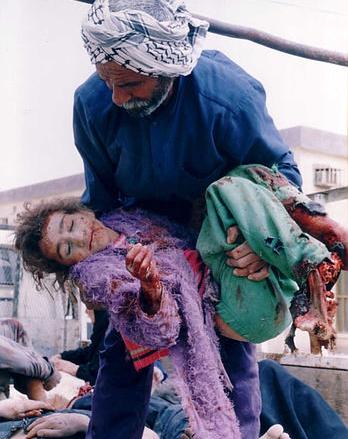Collective punishment
 We've seen it in Fallujah, Ramadi, Bagdhad and numerous other cities and towns in Iraq. Pictures of the casualties of US military assaults. Rarely if ever ,do we see military victims or military equipment or weapons in these pictures. Always we see dead women and children, husbands, sons, fathers, daughters. Destroyed homes and destroyed infrastructure. The dead are referred to as "collateral damage" as though it was all an unfortunate accident. Now we are seeing the same pictures emerging from Gaza and Lebanon. These types of occurences are all too common for them to be accidents. They are what is known as "collective punishment" and they are in violation of the Geneva Convention, agreed to and signed by both the US and Israel.
We've seen it in Fallujah, Ramadi, Bagdhad and numerous other cities and towns in Iraq. Pictures of the casualties of US military assaults. Rarely if ever ,do we see military victims or military equipment or weapons in these pictures. Always we see dead women and children, husbands, sons, fathers, daughters. Destroyed homes and destroyed infrastructure. The dead are referred to as "collateral damage" as though it was all an unfortunate accident. Now we are seeing the same pictures emerging from Gaza and Lebanon. These types of occurences are all too common for them to be accidents. They are what is known as "collective punishment" and they are in violation of the Geneva Convention, agreed to and signed by both the US and Israel.Article 33. No protected person may be punished for an offence he or she has not personally committed. Collective penalties and likewise all measures of intimidation or of terrorism are prohibited.
Pillage is prohibited.
Reprisals against protected persons and their property are prohibited.
Under the 1949 Geneva Conventions collective punishments are a war crime. Article 33 states: "No protected person may be punished for an offense he or she has not personally committed," and "collective penalties and likewise all measures of intimidation or of terrorism are prohibited."
By collective punishment, the drafters of the Geneva Conventions had in mind the reprisal killings of World Wars I and II. In the First World War, Germans executed Belgian villagers in mass retribution for resistance activity. In World War II, Nazis carried out a form of collective punishment to suppress resistance. Entire villages or towns or districts were held responsible for any resistance activity that took place there. The conventions, to counter this, reiterated the principle of individual responsibility. The International Committee of the Red Cross (ICRC) Commentary to the conventions states that parties to a conflict often would resort to "intimidatory measures to terrorize the population" in hopes of preventing hostile acts, but such practices "strike at guilty and innocent alike. They are opposed to all principles based on humanity and justice."
Wikipedia

0 Comments:
Post a Comment
<< Home